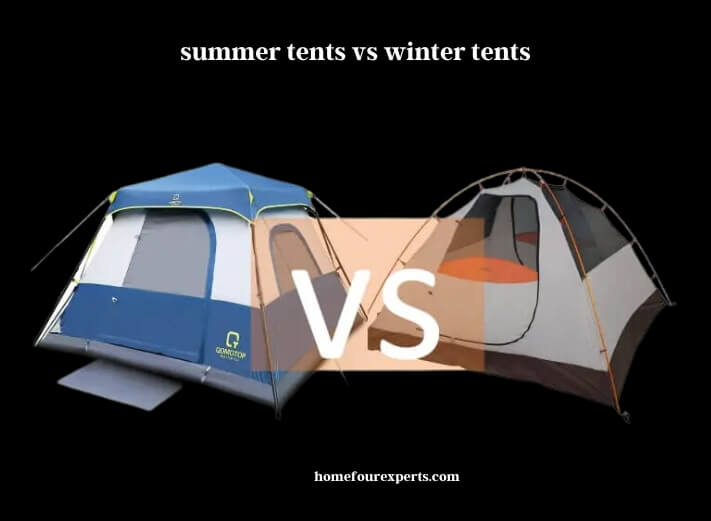Undoubtedly, planning for camping and hiking needs a lot of preparation and brainstorming. But if you are planning with enough time in hand, you should be equipped with all the necessary information and tools.
When it comes to tents, you need to factor in the weather for sure. So, it is always a good idea to search for the ideal type of tent before you plan your next camping or hiking trip. Follow along to discover more on what type of tent works best for you.

Why Do You Need Different Tents for Different Weather?
While going on a camping trip, your objective is to eliminate all the possibilities of any turbulence to maximize the comfort to enjoy the time as much as you can.
To achieve that, ensuring a comfortable and relaxing set up to sleep at night is essential to compensate for the journey and adventure. So, you need to ensure a good ambiance to sleep at and the temperature inside the tent is one of the key components for that.
The concept of ideal temperature varies a lot from summer to winter, so does the method to achieve that. That is why you need different tents, designated for each weather type.
Summer Tents vs Winter Tents
Before you decide on whether or not to choose a summer or winter tent, you need to know the details of summer and winter tents.
Summer Tents
Summer tents are also known as the 3-season tent, as it is meant to be used during the summer, spring, and fall- these three seasons. They mainly feature light pole structure, lightweight materials, and scopes of ample ventilation. Ventilation is key for a 3-season and it is what sets it apart from a winter tent.
As you can guess, while camping during the summer, we need plenty of ventilation inside the tent to maintain the ideal temperature. However, the exact opposite is needed for the same goal during the winter and cold weather. Besides, the summer tents are also designed to keep the annoying mosquitoes at bay.
Winter Tents
Although the name 4-season tent might baffle you, they are usually only meant for the cold weather. The 4-season tents provide significantly less airflow for enough ventilation during the warm weather. Besides, when it is designed keeping the winter in mind it is supposed to block airflow as much as possible.
That being said, it is ideal for camping during the winter as it will help you to maintain the ideal temperature inside your tent.
The key features that the winter tents include are durable and heavier material for the body which provides a lot less ventilation than the 3-season ones. Besides, it also has stronger poles and more in number than the summer tents. And the slopes are quite steeper as well to help it to shed snow.
Usually, the 4-season tents are double layered. But the single-walled ones ensure breathability and are mostly waterproof, however, we suggest not to opt for it in the rainy weather. This type is best suited for cold-dry weather conditions, where you need little ventilation to keep the moisture from accumulating on the surface.
There is another variety of winter tents which is called 5-season tents. These are made for professional and experienced campers that is why some also call them expedition tents. The main purpose it serves is to provide strong coverage against very rough and cold weather.
But keep in mind that the 5-season ones are only made to endure harsh or moderately harsh weather. However, it will not be a smart option for warm or nice weather, as it might get you very warm due to lack of ventilation. Besides, these tents are very expensive (over $1000 sometimes!). So, if you are an amateur/occasional camper, this hefty purchase might not be worth it.
Prevent Condensation Inside Your Tent
While you want to prevent condensation inside your tent, you need to know what causes the condensation. The main cause of condensation is moisture and humidity. So, the main objective is to keep the moisture at bay.
Allowing enough ventilation inside your tent is very important in this regard. Let the airflow from inside out so that it gets less scope to accumulate the moisture.
Leave the wet clothes outside to dry up. The wet clothes inside your tent increase the humidity level inside the air of the tent. So, the less you incorporate wet clothes or moisture into the air, the better it is.
Another great tip to prevent moisture inside the tent is to avoid a place beside lakes, ponds, or any water bodies before you set up the tent. That way, the air near the tent will be less humid and will decrease the chances of condensation inside the tent. Also, make sure you avoid low points to set up your tent because it also increases the chances of accumulation of moisture inside tents.
While choosing a tent to purchase, sticking to your instincts and your requirements is the most important factor to consider since everyone has a distinct preference than the others to go camping on. Whether you’re a team or a solo camper, buying the right size of your tent is important.
So, be sure to consider the weather of the campsite, venue, mode of camping, vehicle, and every other aspect before making your investment. And if you are not sure what to buy, borrowing or renting a tent to try out is always helpful to make your decision on buying.
FAQs
Is a 4-season Tent Good Use for Summer?
You can use that for summer camping if you are ready to compromise the sweating and heating inside the tent. The 4-season tents are specially made to provide minimal ventilation and thus, end up making the air more humid. That might be something you want to avoid while you are camping during the summer. It might be especially uncomfortable when you are sharing the tent with other people.
Can Air Mattresses Be Used in Winter Tents for Comfort?
Yes, air mattresses can be used in winter tents for comfort, but it’s important to insulate them from the cold ground. A tent camping cot can help elevate the air mattress off the ground, providing extra insulation and keeping you warm throughout the night.
Can a Summer Tent Be Used as a Rainproof Backpacking Tent?
Yes, top rainproof tents like the summer tent can be used as a rainproof backpacking tent. These tents are designed to withstand various weather conditions, including heavy rain. With proper setup and additional waterproofing, a summer tent can provide reliable protection for backpackers during rainy expeditions.
As a Starter, What Tent(s) Should I Invest in If I’m Exploring Multiple Camping Trips Frequently?
We usually advise the armatures to borrow or rent tents instead of purchasing, but if you are starting to go camping often, it is a great investment to buy your tent, and perhaps a multiple.
Generally, the 3-season tents are quite versatile, so starting with that one is a good idea. If you like to take solo trips, the single unit tents might be ideal, but otherwise, take the 3-4 people tent so that you can accommodate friends and family on your trip.
After that, you might want to consider a 4 or 5-season tent for cold or harsh weather conditions. We recommend going in groups instead of a solo on winter trekking. And for that, opting for a 4-5 people tent is recommended.
Finally, when you can complete your starter kit with a single unit of 2 or 3-season tents. That will come in handy in most of your solo adventures.
What Tent Should I Pack If I Am Planning a Trip Having a Multitude of Weather Conditions?
In that case, think about the entire trip, how you are going to spend it. If you are planning on spending a major portion of your trip in cold weather, 4-season might be the way to go. Otherwise, a 3-season tent is ideal.
All in all, 3-season tents are quite the versatile ones. Unless the extreme cold or snowy condition, it can provide you decent coverage during the moderate cold weather. Plus, you can use some more layers of blankets for insulation inside your sleeping bag to keep you warm.
Is a 4-season Tent Heavy to Pack?
A: There are several tents available in a range of weight. Most of the tents come in 5-17 lbs. So, it comes to you which one to choose, whether or not you are backpacking or having a much more comfortable, relaxed trip with a vehicle.
Conclusion
The principle contrasts between a summer tent and a winter tent are that winter tents offer more prominent insurance against the components. They should be sufficiently able to withstand high breezes and blizzards.
Winter tents have less ventilation and buildup becomes a more noteworthy issue. You can utilize a summer tent for winter outdoors, yet it truly boils down to the sort of tent you have and where you will camp. In the event that you are enjoying the great outdoors in the mountains, a summer tent will simply not cut it.
Summer tents can be utilized in the winter in the event that they have shut off protection and an appropriate rainfly or covering.
As usual, whenever you camp in the winter backwoods, you’ll need to be arranged and practice great winter security rehearses.
Relevant Resources:
About This Writer

Guys, I am Camila Avery and I love to help my mom to do indoor & outdoor activities. As a lady, I have passed my time on gardening, home improvement, and personal or self-care. I have acquired some degrees in outdoor recreation, beauty, and hair care. It is not easy to work with top-level professional beauty experts. But, I got that opportunity and experimented with different hair extensions, hair colors, and cuts.